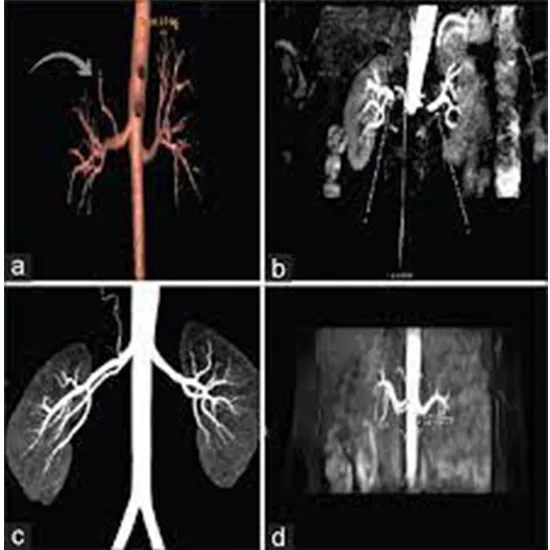
A renal angiography is a type of imaging test that examines the blood vessels in your kidneys. It can be used by your healthcare provider to examine blood vessel ballooning (aneurysm), blood vessel narrowing (stenosis), or blood vessel blockages. He or she can also assess how well blood flows to your kidneys.
The radiologist injects a contrast dye into the artery that leads to the kidney for the test. The dye is then observed as it flows through the blood vessels in the kidneys using X-ray images. A renal angiogram may be required to assist your healthcare provider in detecting problems in your kidney's blood vessels. These issues may include: Blood vessel enlargement (aneurysm)
Blood vessel constriction (stenosis), A blood vessel spasm (vasospasm), faulty connection between arteries and veins (arteriovenous malformation), Clot in the blood (thrombosis)
Blockage (occlusion) (occlusion) A renal angiogram may also be required to assist your provider in diagnosing: Tumours, Bleeding (haemorrhage) (haemorrhage), Kidney transplant complications.
You should inquire with your doctor about the amount of radiation used during the test. Inquire about the risks that apply to you.
Consider keeping a record of all X-rays you receive, including previous scans and X-rays for other health reasons. Show your provider this list. The risks of radiation exposure may be related to the number of X-rays and X-ray treatments received over time.
Inform your healthcare provider if you are pregnant or suspect you are pregnant. Pregnancy radiation exposure may result in birth defects.
Are you allergic or sensitive to any medications, contrast dye, or iodine? There is a risk of allergic reaction to contrast dye because it is used.
Have kidney failure or other problems with your kidneys. The contrast dye can cause kidney failure in some cases. If you take certain diabetes medications, you are more likely to develop this condition.
Your healthcare provider will walk you through the procedure. Any questions you have about the procedure, ask him or her.
You may be asked to sign a consent form authorising the procedure. If anything is unclear, read the form carefully and ask questions.
Before the procedure, you will be instructed not to eat or drink anything (fast). Your healthcare provider will advise you on how long you should fast. It could take several hours or even overnight.
A blood test may be required prior to the procedure to determine how long it takes your blood to clot. Other blood tests may be required.
To prepare, follow any additional instructions provided by your provider.
You will be taken to the hospital's recovery room. A nurse will monitor your vital signs as well as the injection site. He or she will examine the circulation and sensation in the affected leg.
Unless your healthcare provider instructs you otherwise, you may resume your normal diet and activities following the test.
A CT Renal Angiogram Test is typically performed in a hospital's radiology department or an outpatient imaging facility. So, for the best services and reliable results, schedule your test at Ganesh Diagnostic in Yamuna Vihar.